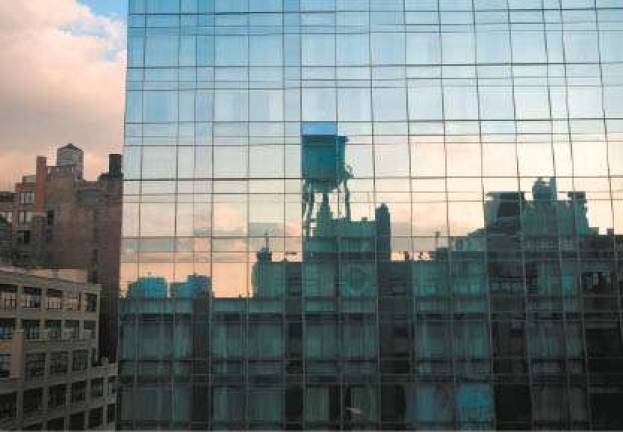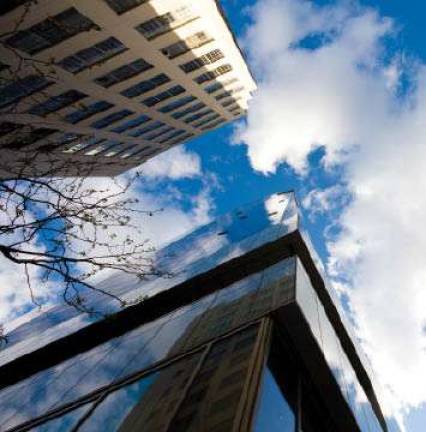Trump SoHo: Up In The Air


When the mega-project was built, Donald Trump agreed to residency requirements to placate neighbors. But those rules were ignored, and pressure is building again as the project seeks a buyer
Soho With the Trump SoHo set to foreclose, and the prospect of new owners acquiring the property, members of a historical society in Greenwich Village want the city to enforce residency requirements that enabled the 46-story condo-hotel to be built in the first place -- stipulations that they say the city failed to enforce since it opened in 2010.
The Greenwich Village Society for Historical Preservation criticized developers' plans for the condo-hotel since news of it broke in 2006. Chief among their concerns was that the glass-tower high rise proposal was out of step with the surrounding neighborhood, which is characterized by five and six-story historic cast-iron and brick masonry buildings. Their biggest foothold, though, was that the area is zoned for manufacturing, which precludes the creation of permanent residences.
To get around this, developers and other backers of the project, including the Sapir Organization, the Bayrock Group, and Donald Trump, negotiated with the city to limit the number of nights an owner could stay at the Trump SoHo. Then-borough president Scott Stringer created a "restrictive declaration" on the project that said condo owners could not stay in their units for more than 120 days out of the year, or more than 29 days out of any 36-day period. The condos would be rented as hotel rooms when owners were not occupying their units.
The stipulations were agreed to by all parties and, over the objections of GVSHP and other neighborhood groups, construction was completed and the Trump SoHo opened for business in 2010. As part of the agreement, the Trump SoHo agreed to conduct internal residency audits, which they would submit to the city, and would be subject to independent audits.
In 2013, after months of requesting the information through traditional channels, the executive director of the GVSHP, Andrew Berman, filed a Freedom of Information request with the city to determine what those audits revealed. Turns out, he said, both the Trump SoHo and the city failed to conduct any audits on how often owners were occupying their units.
"We at least thought they would be following the basic premise, which is that these audits would be done, they would be filed with the city, and the city would check them," said Berman. When the information request came back, "they said since the opening of the Trump SoHo in 2010, that no audits had ever been submitted, the DOB had never asked them to submit the audits, and that the DOB had never issued any violations or fines for the audits not having been filed."
Alex Schnell, deputy press secretary for the DOB, did not confirm whether his department was responsible for obtaining the audits. The restrictive declaration states the Trump SoHo has to submit an audit, certified by an independent public accountant, to the DOB every March. It's unclear whether in the absence of such audits, the DOB was required to follow up with the Trump SoHo and obtain the records. The restrictive declaration does state that the Trump SoHo has to turn over the records within 10 business days of such a request from the DOB.
Schnell did say that the residency restrictions still apply to the Trump SoHo going forward. "The restrictive declaration is still in place for any successive owners," said Schnell.
In response to GVSHP's request that revealed no audits were ever submitted to the DOB, the department sent a "notice of deficiency" to the Trump SoHo asking for the residency audits since it opened.
Throughout the time the GVSHP was trying to get access to the audits, the Trump SoHo, which is managed by Trump Luxury Real Estate, was having trouble selling its units. According to an article in The Wall Street Journal, less than one-third of the hotel's 391 units had been sold when the lender, CIM Group, announced recently it would foreclose on the property and put it up for sale.
Berman would like the city to stick to its restrictive declaration once the property is acquired by new owners.
"We wrote to the city saying, 'Look, ownership is going to change hands and as a new administration we urge you to enforce the restrictive declaration in a way that your predecessors did not with the prior owner,'" said Berman. "We're hoping that the new administration, with a new owner, will in fact enforce it."
According to Faith Hope Consolo, a principal at real estate giant Douglas Elliman, the Trump SoHo will have no trouble finding a new owner, despite the residency restrictions and declining prospects of the hotel-condo model.
"Someone is going to invest in this. Real estate is all about location, location, location, and SoHo is a great location," said Consolo. "And the hotel itself is reportedly successful, so I would expect that a hotel company would be interested."
Consolo agreed that the residency restriction is an issue, though, and said that the new owner might try to convert more of the units into hotel rooms or cut prices so the condos will sell.
"SoHo isn't a resort area, and the prices are high for a unit you can't live in for more than a third of the year," she said. "I'd look for a major hotel investor or developer to be interested."
Most condos at the Trump SoHo go for $1.2 million to $2 million, according to data on the website Street Easy.
Brokers for the property, Adam Spies and Doug Harmon of Eastdil Secured, did not return a request for comment.